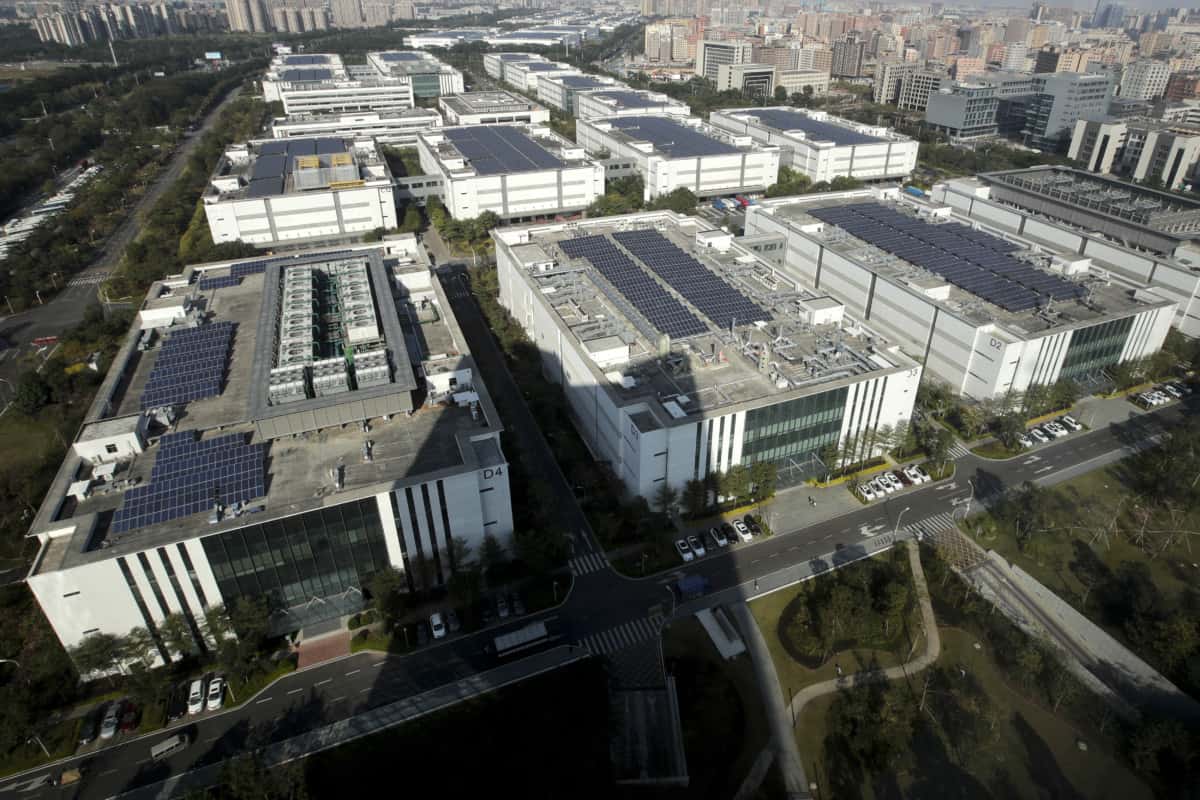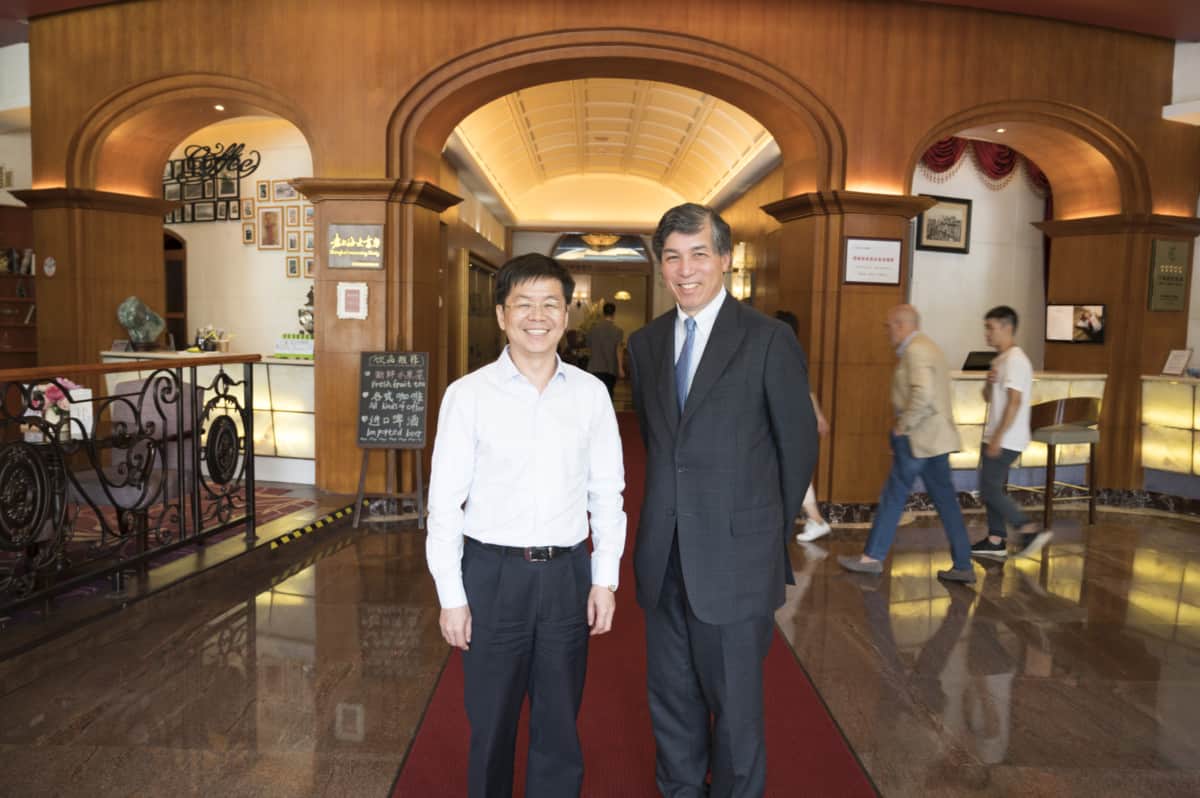Willy C. Shih, a professor of management practice at Harvard Business School, likes to talk about solutions. He is an expert in manufacturing, supply chains and intellectual property rights. He serves on the board of Flex, one of the world’s biggest contract manufacturers. And since China is a manufacturing giant, he spends a lot of time there, visiting the country’s major companies and trying to understand their manufacturing operations and supply chains. On his coffee table at Harvard is Marc Levinson’s book, “The Box: How the Shipping Container Made the World Smaller and the World Economy Bigger,” a book he highly recommends. What follows is a lightly edited Q. and A.

Illustration by Lauren Crow
Q: For the past month, we’ve seen a huge disruption of supply chains tied to the global pandemic. Given your expertise, are we learning anything new about the structure of our global networks?
A: What we are going through on global supply chains is really quite remarkable. First we had the supply shock, with China suddenly shut down for a month. After China started up again, the rest of the world created a demand shock, with companies trying to cancel orders and consumer demand for things like automobiles and soft goods cratering. It’s like you suddenly lowered the level of the ocean and exposed all of the reefs, undersea mountain ranges, and all the other things that can get you in trouble … but all at once.
We’ve learned a lot. First of all that we are dependent on a multi-tiered network of suppliers — suppliers who feed suppliers who feed suppliers. And sometimes we don’t know or are surprised when we go way down and discover who some of them are. You discover that everything traces back to one geography. Whoops! We also have learned that modern supply chains are completely dependent on reliable logistics links — ocean, air, trucking — and when you suddenly remove that reliability, either by grounding a lot of capacity or cancelling a lot of sailings, materials don’t show up when you need them, where you need them. The mantra that “inventory is evil” is coming back to bite us as we find out that maybe it would have been nice to have a lot more N95 masks or personal protective equipment sitting around.
Are we discovering that this global supply chain has some serious problems?
There are benefits to the way things are set up when everything works well. We have at our fingertips (or two-day delivery) a vast choice of products, seasonal fruits and vegetables out of season, goods and services provided by people who can specialize in producing them from all over the world. But we have also learned a lot about resiliency through all this, and I think this will lead us to revisit a lot of those traditional assumptions in supply chain design. We will probably see more regionalization of production, such as production closer to the point of consumption. And that might precipitate a steep decline in world trade, at least for a while. One thing I hope people will do is take scenario planning and contingency planning more seriously.
Let me turn to another aspect of this connected world: America’s relationship with its strategic rival, China. In a sign of the Trump administration’s hardening stance toward China, the federal government blacklisted the Chinese telecom giant Huawei in 2019 and warned other nations against using its equipment. If Huawei is really a global powerhouse, did it get there by adopting global standards? Isn’t this a company that was once accused of stealing intellectual property from American companies like Cisco and Motorola?
Yes, they’ve come a long way. Cisco went after them some time ago for I.P. [intellectual property] violations, so they got a lot of practice in this area. Since then, they have helped change the development of I.P. in China. I would argue that the global telecom industry is way ahead in terms of enforcement. Companies have to file patents. And so Huawei got thrown into the fray early and had to defend itself. They’re in a field dominated by patents. So today, they are much more advanced in how they approach it.
| BIO AT A GLANCE | |
|---|---|
| AGE | 68 |
| RESIDENCE | Jaffrey, New Hampsire |
| BIRTHPLACE | Madison, Wisconsin |
| CURRENT JOB | Professor, Harvard Business School |
| EDUCATION | MIT, UC Berkeley |
| SPOUSE | Julie |
| CHILDREN | 2 |
The lawsuits and I.P. battles with U.S. firms in the 1990s and 2000s actually strengthened the company?
They learned how to play the game. And now, the game is 5G or 4G LTE. It’s in what are known as “standard essential patents.” If you get your patent into the global standard, others have to pay royalties to you. Therefore, you want to get as many of your innovations and ideas into the standard. The more you have in there, the more people have to pay you, and that offsets the cost of your investment, as well as what you have to pay others for their standard essential patents. Huawei has done that. If you look at the standards committee nowadays, they field a lot of people on the committees. As a consequence, they’ve gotten a lot more of their I.P. adopted in the 5G standards. That’s the same game Qualcomm plays.
So Huawei is now helping to set global standards for the telecom industry and 5G?
Yes. If you look at the IEEE [Institute of Electrical and Electronics Engineers] publications over the years and go back to the 1970s and 1980s, it is a snapshot of who is doing the R&D. Who authored those IEEE publications? Who was doing the frontier research and the commercialization? For a while, there was a lot of pioneering work coming out of American companies like Bell Labs and Motorola. There were Europeans, like the Scandinavians. Then, in the 1980s and 1990s, the dominant authorship shifted to the Japanese and Koreans. And now, if you look at the papers, they’re all from China and Singapore. During the past 15 years, they’ve all been from Asia. That just foreshadows who the dominant players are going to be.
And how exactly is Huawei at the forefront of 5G?
Most people who talk about Huawei don’t understand 5G. When you think about your cellphone, what is the equipment you need to get the signals? It’s the routers, fiber-optic gear, the radio transmitters and receivers. And then, as you think about it, you have those towers with the transmitters. And it’s the radio gear that links over the air to your cellphone. And the companies that produce it are: Huawei, Ericsson and Nokia. It used to be U.S. companies like Lucent. But today, there are no U.S. providers. Cisco doesn’t make equipment like that. Nokia and Ericsson have labs and some assembly in the U.S., but now there are no U.S.-based companies in this industry. People worry about 5G, but no one in the U.S. is making 5G radios.

Credit: AP Photo/Andy Wong
Are U.S. efforts to blacklist Huawei based on worries about falling behind them in 5G development or something else?
I’ve talked with people in the Defense Department and the Trump administration. I think they worry about the loss of American capabilities. If we had to fight a war, where would we go to get equipment, especially if foreign suppliers, say from China, cut us off?
Should this be a genuine concern for the U.S. government and American companies?
I have not seen a balanced analysis of this issue. You don’t want to be freaking out about this. What you really want to be freaking out about is that Intel is one or two generations behind TSMC [Taiwan Semiconductor Manufacturing Company]. You want to be freaking out that GlobalFoundries, the last big merchant semiconductor fab in the U.S., has given up competing at the most advanced chip processes. Most of the advanced merchant capacity is in Taiwan. Half the world’s foundry capacity is in three science parks in Taiwan. Intel is maybe two generations behind TSMC in the leading edge, 5 nanometer process technology. They used to be ahead by multiple generations in the most advanced technologies. In terms of the finest geometry chips — 5 nanometer chips — Intel has fallen behind and GlobalFoundries has thrown in the hat.
In the U.S., what should the federal government’s priorities be?
I think the answer to this kind of threat is to run faster. The U.S. is good at basic science. The DOD [Department of Defense] pioneered a lot of technology. Ethernet. GPS. DARPA [Defense Advanced Research Projects Agency] pioneered that. The DOD and DARPA pioneered a lot of ideas that flowed down to commercialization. But there’s a lot of work that happens between DOD or DARPA investing in something and it being commercialized. You also have to invest more in R&D.
I frequently cite the Energy Efficient Engine, the E3 engine program that was funded by NASA. How do you improve the energy efficiency of engines? It was in the form of contracts with American companies. It helped position them for global leadership in large commercial turbofan engines. GE received a contract from NASA to experiment based on their CF6 platform. That led to the GE 90 on the Boeing 777 and the GEnx on the Boeing 787. The technology advances flowed down into their other products.
We know how to do these things. The government funded GE and Pratt & Whitney. That became the core of the GE 90 program. That was basic R&D. That became the basis of GE Aviation’s global leadership in large turbine engines. They’re now the world leader. GE Aviation is unequaled. They’re ahead of Rolls Royce in large commercial engines.
| MISCELLANEA | |
|---|---|
| MUSICAL INTEREST | Mozart piano concertos; Mendelssohn, Beethoven, Copland and Scott Joplin |
| FAVORITE FILM | “The Sting” (1973) with Paul Newman and Robert Redford |
| NOW READING | “Designing an Internet,” (2018) by David D. Clark |
| WHO DO I MOST ADMIRE? | Winston Churchill |
Isn’t Qualcomm another American company that benefited from federal research programs, helping set global standards in telecom?
Yes, and Qualcomm is misunderstood, too. A lot of their technology did come out of the DOD. They worked on CDMA [code-division multiple access], which was based on the DOD’s early investments in spread-spectrum technology. That was a fundamental technical shift that allowed many more phones to operate within the available spectrum. When Andrew Viterbi and Irwin Jacobs [co-founders of Qualcomm] tried to commercialize this, there were a lot of experts in the field who were skeptical, but the company persisted and invested for more than a decade. That was really a revolution. This was a fundamental shift. Qualcomm built a formidable patent position as a result, and when CDMA technology went into things like 4G LTE, they were able to collect a lot of royalties. I don’t begrudge them for that; I think they earned it. People might not like the licensing terms, but we should remember that Qualcomm was the pioneer in CDMA for commercial use.
Which brings us back to Huawei. The Trump administration blocked a Singapore-based company called Broadcom from acquiring Qualcomm in 2017, somehow hinting that the technology might fall into the hands of the Chinese. And then, the administration backed an effort to block Huawei from doing business in the U.S. or with key American allies. And even before Huawei came under scrutiny, the U.S. nearly put ZTE, another big Chinese telecom company, out of business for violating Iranian sanctions — for a second time. How would you characterize these actions against two of China’s biggest telecom-equipment and mobile phone makers?
When the U.S. government was about to shut down ZTE, a few things became clear. It sent a message: The U.S. is now willing to weaponize supply chains. If you are ZTE or Huawei, this led to a near-death experience. They were in a virtual shutdown. If you were running Huawei or ZTE, what would you do? I saw that first with ZTE, in the spring of 2018. I was in Shanghai at the time and everyone was asking me whether the U.S. would allow ZTE to stay in business. We’ve seen this coming for a long time. When you break the trust, companies don’t want to rely on the U.S. anymore. These are strategies predicated on making others fail. We shouldn’t try to put a company out of business.
Isn’t there a legitimate concern about whether Chinese technology companies violate I.P. rights or put national security at risk? Hasn’t ZTE even acknowledged violating U.S. sanctions after being punished, essentially admitting that it was in the wrong?
It’s very important to protect intellectual property, and to fight infringements and penalize those who violate agreements or laws. I spent many years when I was in the industry fighting patent infringements in Asia. That is part of enforcing a rules-based order that we should want companies everywhere to play by. Let’s say I don’t want to use American technology if it is covered by patents, and I use technology that I source from Japan, Korea or Europe. Those countries and regions are also going to want you to play by those rules.

Courtesy of Willy Shih
So you’re saying it’s fine to penalize them, but don’t seek to put them out of business because that is a bad message to other global companies. Is that right? Is your concern that other foreign firms will lose faith in American products and the U.S. supply chain?
That’s right. They’ve had near-death experiences using U.S. components, so they’re going to design chips themselves or they’re going to use domestic Chinese suppliers. They are reaching out to work with domestic Chinese companies, even if those companies are weak. They will strengthen them and make them potent competitors to American suppliers. The Chinese government has even ordered some Chinese companies to stop using some American products. The Chinese government would not like any dependence on the U.S. And if you were in their position, looking at how the U.S. is weaponizing supply chains, you might say the same thing. These Chinese companies are not going to depend on U.S. chips and that can have a huge effect on U.S. companies. Do you know who uses IBM mainframes? Among their largest customers are Chinese banks.
Huawei has been blacklisted and put on the U.S. entity list, which means that American companies are barred from selling goods directly to Huawei. The authorities also added a number of other high-tech companies to the list in the past year, including several Chinese companies engaged in developing artificial intelligence software — some of which may have been used by the authorities in Xinjiang. Has the die been cast?
Do I think the die has already been cast? The Chinese have already figured out the die was cast. We have fundamentally weakened trust.
How is China responding? Its largest technology companies are still heavily dependent on chips, or semiconductors, that were designed in the U.S., at companies like Intel, Qualcomm and Nvidia. Will they start producing their own homegrown chips?
That is already underway. HiSilicon is the captive, in-house chip design shop for Huawei. If you look at who is designing 4G and 5G chips, the big one is Qualcomm. Another one with the capabilities is Samsung. And there’s Mediatek of Taiwan. Then HiSilicon. China’s dilemma (or HiSilicon’s) is: How are they going to get away from their dependence on Qualcomm for core mobile chips?
How should the U.S. respond if China moves away from using American chips? What’s the lesson here?
Let me tell you a story. I had just returned from a trip to Antarctica and I went to see Jason Miller, who was Obama’s manufacturing czar. I walked into his office and said, ‘Hey Jason, want to know what Willy learned from the penguins in Antarctica?’ His office looked at me with that, ‘We’re waiting to hear this one’ look. I told them that until penguin chicks fledge, the parents have to go down to the sea and fish for krill. Then they march up to the nests to feed the chicks. And when the food supply gets tight, they let the weaker chick die. I know that sounds so sad, but the moral of the story is take care of your strengths and you may have to let the weaker ones die. Jason came back with, ‘Right, don’t worry about the wire coat hanger industry, invest where we have strength and leadership today.’
There’s a tendency to want to help people who are struggling. I understand that. But my point is the best investment is to strengthen your leadership. Some of the people in Washington think Massachusetts doesn’t need help in the biotech industry, because it’s strong. I said, ‘Look at it the other way. You actually have to strengthen areas where you are strong.’ We should be strengthening aerospace research. A lot of the areas that are already lost, we can’t get them back. But the first order of business should be to strengthen areas where people want to trade with you. So that others will want to, will need to, trade with you. Now over time, I hope that means not just chip design, but chip manufacturing.

David Barboza is the co-founder and a staff writer at The Wire. Previously, he was a longtime business reporter and foreign correspondent at The New York Times. @DavidBarboza2



